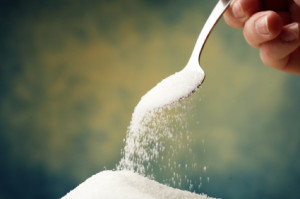What are Sugar Alcohols? Sugar alcohols (also known as polyols) are carbohydrates that are incompletely absorbed from the small intestine into the blood and metabolized by the body. When sugar alcohols are being metabolized, they require the use of little or no insulin. They contribute fewer calories than other sugars. On average, sugar alcohols contribute 2 kcal/ g compared to 4 kcal/g from monosaccharides or disaccharides.
Names of Common Sugar Alcohols: Erythritol , Hydrogenated starch hydrolysates, Isomalt, Lactitol, Maltitol, Mannitol, Sorbitol, Xylitol
The facts: Sugar alcohols occur naturally in many fruits and vegetables. If they are commercially produced, they are derived from other carbohydrates including sucrose, glucose, and starch. They are Generally Recognized as Safe (GRAS) by the FDA.
Advantages:
- Sugar alcohols have less of an effect on blood glucose that other carbohydrates
- Products containing sugar alcohols can be labeled as “sugar free.”
- May reduce dental carries
- Foods with sugar alcohols can have fewer calories than foods made with sugar
- If a food has more than 5 grams of sugar alcohols per serving: Subract 1/2 of the sugar alcohols from total carbohydrates (Example: Food has 6 grams sugar alcohols and 10 grams total carbohydrates: Substract 3 from 10 to give you 7 total carbs)
Considerations:
- Check the fat content: Many times, additional fat may be added to a product that contains sugar alcohols
- Consider the price: Sugar-free products can be more expensive.
- Recognize potential GI symptoms: Sugar alcohols are likely to have a laxative effect in some people, especially children. a. The Academy of Nutrition and Dietetics (AND) states consuming more than 50 grams per day of sorbitol and more than 20 grams per day of mannitol may cause diarrhea.
More Information & Resource:
Position of the AND: Use of Nutritive and Nonnutritive Sweetners (May 2012)



Leave a Reply